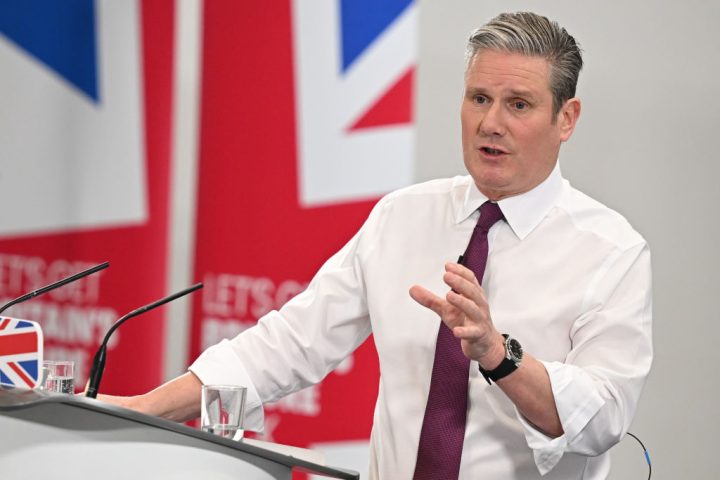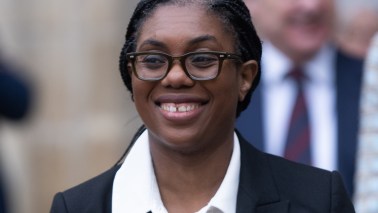There is a modern country music standard called ‘When You Say Nothing At All’. The song, taken to the top of the UK pop charts by the Irish singer Ronan Keating a quarter of a century ago, is a treatise on the power of non-verbal communication. The central ‘hook’ line involves someone telling their lover: ‘You say it best when you say nothing at all.’ That sentiment came to mind in an altogether less romantic context on Thursday, as I was listening to radio news reports of Keir Starmer’s opening salvos in this crucial year in politics while on a long drive. After a couple of weeks of blessed Christmas relief, there was that strangulated, robotic voice once again uttering the most plodding, boilerplate political prose: ‘Bringing people together…the common good…meet fire with fire’ etc.
Starmer has profited from the Tories devising innovative new ways of seeming ever more repellent to the electorate
When asked to think on his feet by responding to Rishi Sunak’s heavy hint that there would be no election before the autumn, the best Starmer could come up with was an accusation that the Prime Minister was ‘squatting in Downing Street’. Given that the Tories won a full five-year term in December 2019 this was obviously nonsense. A more fluent performer would have reached for the ‘running scared’ soundbite and added a topical garnish – even Lib Dem leader Ed Davey managed that.
Labour members might have hoped when electing a former high-powered barrister for party leader that one thing they could at least be sure of would be a powerful and persuasive orator front of house. But the contrast with, for example, the booming baritone and lyrical imaginative lilt of Geoffrey Cox KC MP in full flow could hardly be more marked.
So, might having a leader of the opposition with a severely off-putting voice, no gift for a phrase and no antennae for the public mood yet prove a crucial factor in the outcome of the next general election? The fact that Labour high-ups are reportedly preparing to keep Starmer out of TV debates against Sunak – who himself often comes across as more akin to the sensible sixth-former in The Inbetweeners than a great statesman – suggests that this is a live concern for them.
It is often said that governments lose elections rather than oppositions winning them and Starmer has certainly profited from standing back while the Tories devise innovative new ways of seeming ever more repellent to the electorate. That he looks the part of a national political leader is also a big advantage for him, helping to secure him a personal polling advantage over Sunak as well as a party one. But what if it is the case that while normal people occasionally look at opposition leaders between elections, they only really listen to them at elections?
Starmer and Labour are justifiably hot favourites to win a parliamentary majority given their enormous polling lead. But they will need to be on much better form than they were this week to insulate themselves against the risk of their prospects ebbing away as the election year progresses.
There is, as yet, no trace of Starmer having benefited from voice coaching, which is surprising for one so obviously determined to succeed. His stilted, nasal delivery is unchanged and whenever he has to respond in his own words to fast-moving events, he tends to become dullness incarnate.
Very probably just being non-alarming will be sufficient for him to facilitate the processes needed to get him to Downing Street – Tory-leaning voters sitting on their hands on polling day being chief among them. But it has been said this week that many Conservative MPs are now just hoping that ‘something will turn up’ to save them at the election. Extended public exposure to Labour leadership robotics might just be that thing. After all, the 2017 Maybot malfunction – ‘nothing has changed, nothing has changed’ – almost wiped out a 20-point Tory poll lead, so we know it can happen.
If somewhere in the Labour leader’s inner circle there is an adviser who has felt too embarrassed to tell a former director of public prosecutions that he would benefit from vocal coaching, then that person would do well to overcome his inhibitions. Because when the British public turns the sound up on politics later this year Labour would be wise to present them with a human voice.
This article is free to read
To unlock more articles, subscribe to get 3 months of unlimited access for just $5








Comments
Join the debate for just £1 a month
Be part of the conversation with other Spectator readers by getting your first three months for £3.
UNLOCK ACCESS Just £1 a monthAlready a subscriber? Log in